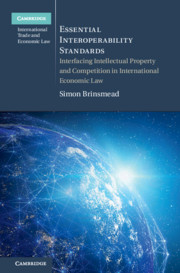 Essential Interoperability Standards
Essential Interoperability Standards Book contents
- Essential Interoperability Standards
- Cambridge International Trade and Economic Law
- Essential Interoperability Standards
- Copyright page
- Dedication
- Contents
- Foreword
- Preface
- Abbreviations
- Part I Foundations and Problems
- Part II The Impact of Intellectual Property and Competition Laws
- Part III Towards Liability and Compensation
- 6 Exclusive Property Rules or Liability Rules for Interoperability Standards and Standards Essential Intellectual Property?
- 7 Access to Interoperability Standards and Standards-Essential Intellectual Property
- 8 Concluding Observations
- 9 Draft Expert Manual
- Bibliography
- Index
6 - Exclusive Property Rules or Liability Rules for Interoperability Standards and Standards Essential Intellectual Property?
from Part III - Towards Liability and Compensation
Published online by Cambridge University Press: 26 October 2021
- Essential Interoperability Standards
- Cambridge International Trade and Economic Law
- Essential Interoperability Standards
- Copyright page
- Dedication
- Contents
- Foreword
- Preface
- Abbreviations
- Part I Foundations and Problems
- Part II The Impact of Intellectual Property and Competition Laws
- Part III Towards Liability and Compensation
- 6 Exclusive Property Rules or Liability Rules for Interoperability Standards and Standards Essential Intellectual Property?
- 7 Access to Interoperability Standards and Standards-Essential Intellectual Property
- 8 Concluding Observations
- 9 Draft Expert Manual
- Bibliography
- Index
Summary
This chapter applies the framework of exclusive property and liability rules originated by Calabresi and Melamed and developed by many others. Within this overarching framework, a detailed law and economics analysis is applied to the fundamental question of whether exclusive property or liability rules should govern interoperability standards and SEIP. The conclusion is reached that the general preference for exclusive property rules should be maintained. Key exceptions to this general presumption should be maintained, notably where two conditions are satisfied: (i) the existence of multiple IPRs reading on the same standard gives rise to a Cournot complements problem; and (ii) where the imposition of legal remedies (e.g. injunction) would have the effect of prohibiting significant non-infringing conduct, such as in circumstances where a patent may protect only one of many innovative features of a product. Consideration is also given to appropriate remedies for infringement of SEIP, and in particular to the correct principles for the calculation of damages in the form of reasonable royalty.
Information
- Type
- Chapter
- Information
- Essential Interoperability StandardsInterfacing Intellectual Property and Competition in International Economic Law, pp. 233 - 278Publisher: Cambridge University PressPrint publication year: 2021